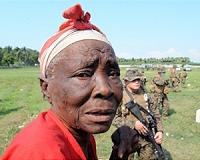| . |  |
. |
Port-Au-Prince (AFP) Jan 25, 2010 Haiti's prime minister begged foreign donors Monday to back the reconstruction of his quake-hit country as police shot looters and a mass exodus from the shattered capital intensified. Nearly two weeks after the disaster which killed around 150,000 people, an emergency meeting of international powers in Montreal heard that it would take at least a decade to rebuild the stricken Caribbean nation. The grim conditions in Port-au-Prince were underscored when Haitian police fired indiscriminately at scavengers who moved into a downtown area being cleared by bulldozers, hitting two looters in the head. "The country is ravaged, I ask myself how it can be rebuilt after this catastrophe. The Haitian government is very corrupt," said Gesnel Faustin, 29, living in a tent outside the destroyed presidential palace. "But if the United States, France and Canada get together for reconstruction, it will work." In Montreal, Haitian Prime Minister Jean-Max Bellerive said the world must map out a long-term strategy for the Americas' poorest nation, after meeting immediate needs for food, water, shelter and health care. "I just want to say that the people of Haiti will need to be helped to face this colossal work of reconstruction," Bellerive told world officials including US Secretary of State Hillary Clinton. Canadian Prime Minister Stephen Harper warned of a long path ahead to rebuild Haiti and urged international leaders to hash out a "coordinated" plan for the ill-starred country. "It was not an exaggeration to say that at least 10 years of hard work awaits the world in Haiti," Harper said. Donor countries had agreed to hold a full conference on aid to Haiti at the UN headquarters in New York in March, Canadian Foreign Minister Lawrence Cannon said. A huge international effort led by 20,000 US troops has struggled to distribute enough aid in the capital and badly-hit towns near the epicentre of the 7.0-magnitude quake, increasing fears about post-quake security. A group of Haitian police, trying to keep control among a desperate population after the quake which was also wrecked the city prison, opened fire on a warehouse where many looters were hiding out. An AFP photographer inside the building said two men were shot in the head, one of whom received medical attention. Two others were lying prone on the floor, one lifeless. The other was treated for a serious head wound. Bulldozers cleared corpse-filled houses elsewhere in the city centre, as hopes dimmed of finding more miracle survivors in the rubble. The last, a man who survived for 11 days by drinking cola, was found on Saturday. The UN said more than 235,000 Haitians have taken advantage of free buses to flee the filthy conditions in Port-au-Prince for more hygienic camps outside the capital. Others have used private transport. Health Minister Alex Larsen said tents were being readied for 400,000 quake victims at mini-villages outside the capital that will initially hold 20,000 people, and in the long term accommodate around one million. But the tide of humanity is putting a huge burden on small towns like Saint Marc, some 80 kilometers (50 miles) from the capital, where 10,000 refugees were lodging with friends, strangers or in churches. "My house was destroyed. We slept on the pavement near the wounded, we had to leave," said Magalie Esteverle, a 43-year-old dressmaker with three children staying with a distant cousin of her husband. Survivors who have stayed on at makeshift camps in the capital have started to piece their lives together by building huts and setting up neighborhood committees, but finding supplies remains a daunting task. "Our aim is to clean these places, get tents and find food and water," said Michel Emile at one of the biggest camps, outside the palace. "But we don't yet understand where the food and water distribution points are located." The international aid effort also came under fire from Italy's public safety chief, sent to Haiti last week, who criticized a lack of leadership in the response to the quake. Guido Bertolaso, who led the response to the L'Aquila earthquake in April 2009, said it was "a terrible situation that could have been managed much better" and said US forces had "too many officers" to find a capable leader.
Related Links Bringing Order To A World Of Disasters A world of storm and tempest When the Earth Quakes
 Refugees from 'nightmare' swamp Haitian town
Refugees from 'nightmare' swamp Haitian townSaint Marc, Haiti (AFP) Jan 25, 2010 The Haitian town of Saint Marc is sinking beneath a tide of humanity, with 10,000 refugees lodging with friends, strangers or in churches after fleeing the nightmare of the quake-hit capital. Buses incessantly pass through the town some 80 kilometers (50 miles) north of Port-au-Prince, loaded with earthquake victims hoping to find food and shelter from the aftershocks of the January 12 disas ... read more |
|
| The content herein, unless otherwise known to be public domain, are Copyright 1995-2009 - SpaceDaily. AFP and UPI Wire Stories are copyright Agence France-Presse and United Press International. ESA Portal Reports are copyright European Space Agency. All NASA sourced material is public domain. Additional copyrights may apply in whole or part to other bona fide parties. Advertising does not imply endorsement,agreement or approval of any opinions, statements or information provided by SpaceDaily on any Web page published or hosted by SpaceDaily. Privacy Statement |